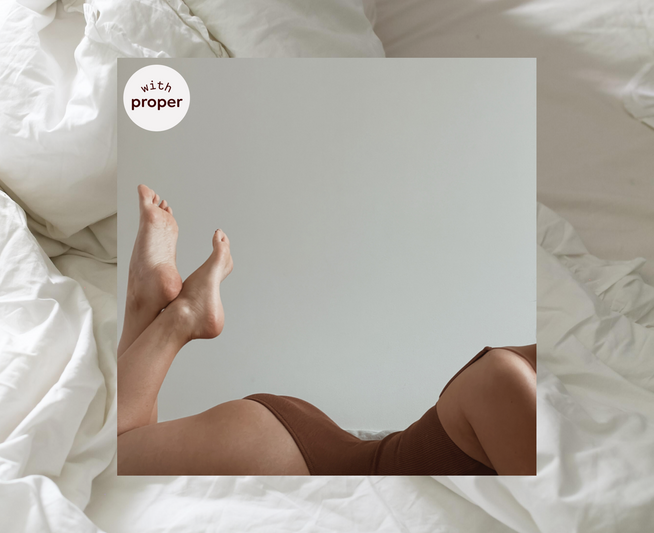As we enter perimenopause and menopause, the majority of women (61% if we’re getting technical) experience sleep issues like insomnia, anxiety, and night sweats. And as if that’s not rough enough, lack of sleep has a domino effect, causing things like increased irritability, depression, and brain fog.
Nobody needs that. So we reached out to our friends at Proper, a brand dedicated to sleep wellness through supplements and coaching, for some guidance. Their resident sleep expert, Dr. Allison Siebern, has been working in clinical sleep medicine for 15+ years, and we chatted with her about how to nip these nighttime issues in the bud.
Read on for some brilliant tips that will have you getting more zzzs.
The Root Cause
It’s those fluctuations in hormones (estrogen, progesterone, serotonin, and melatonin) that are responsible for messing with your sleep. Here’s the download:
-
Prior to menopause, estrogen helps decrease the amount of time it takes to fall asleep, improves sleep quality, and increases total sleep time, on top of regulating body temperature at night, so when levels begin changing, all of those things are affected.
-
Progesterone is related to the drive for breath, so declining levels increase the chances of fragmented sleep and risk for development of obstructive sleep apnea. (See your doctor if you think this is happening to you.)
-
Serotonin is the “happy hormone” that helps stabilize mood and promotes general feelings of well-being, so when levels drop, it can cause anxiety and depression, both of which disrupt sleep.
-
Melatonin is a natural hormone that our bodies produce to regulate the sleep-wake cycle. As women age, levels of melatonin decrease, which affects the circadian rhythm.
Gonna Make You Sweat
About 85% of menopausal women experience night sweats (the sleeptime version of hot flashes). But there are ways to minimize the deeply unpleasant experience of waking up drenched.
-
They can be triggered by caffeine, alcohol, and spicy food (they all boost your internal temp), so it’s worth seeing if there’s a correlation for you there, as that’s an easy fix.
-
Turn the thermostat down to somewhere between 60-67 degrees. We suggest starting at 65 and tweaking accordingly within that window.
-
If you take a bath or shower before bed, make sure it’s not a hot one – cool to lukewarm will prevent your body temp from being too high before bed.
-
The fabric of your pajamas and bedding can be serious heat trappers, especially high thread count cotton. Opt for breathable, sweat-wicking fabrics like hemp, linen, and lyocell/bamboo.
Hazel’s Picks:
Brooklyn Bedding Cooling Pillow
No Wakey Wakey
If you have no problem falling asleep but struggle to stay asleep, there are a few things that can really help.
-
Avoid caffeine and alcohol. The former has an obvious waking effect, while the latter helps you get to sleep but interrupts patterns as your body processes it during the night.
-
Get in a bedtime routine that incorporates a relaxing activity like a (not too hot) bath, meditation, visual imagery, or progressive muscle relaxation.
-
If you do wake up, listen to restful audio content to help you get back to sleep. Calm and Headspace have great options that act like lullabies for grownups. Just make sure your phone is in night mode!
Get A (Restless) Leg Up
There’s an increased prevalence of Restless Leg Syndrome in women going through menopause. Best described as ‘a creepy-crawly sensation with an irresistible urge to move the legs,’ it makes it almost impossible to sleep when it’s happening. Thankfully, there are medications out there that help immensely, so see your doctor if you’re experiencing this.
Behind Closed Doors
The only things that should happen in the bedroom are sleep and sex. No TV, no just hanging out, no screens (blue light is the enemy).
Good Habits Beget Good Sleep
-
Keep nighttime meals on the lighter, healthier side. Follow a low-GI diet – fruits, veggies, nuts, whole grains, lean protein; avoid processed carbs and anything with added sugar.
-
Keep a journal and write down 3 things you’re grateful for before bed.
-
Set a specific bedtime (but realize it takes 21 days for your body to acclimate to a routine). A schedule will help train your body to expect sleep at a specific time
-
Make sure the bedroom is dark. Blackout curtains/shades are a very worthy investment.
Hazel’s Picks:
The Alternative Route
For some women, supplements like valerian root, ashwagandha, and melatonin can be super helpful with sleep. And there is promising research on the impact of CBD on sleep symptoms for menopausal women. (Of course, you should always consult with your healthcare provider before taking supplements.)
Acupuncture has also shown promising results in decreasing hot flashes and improving disrupted sleep and mood in as little as several weeks of treatment, so definitely worth consideration.
